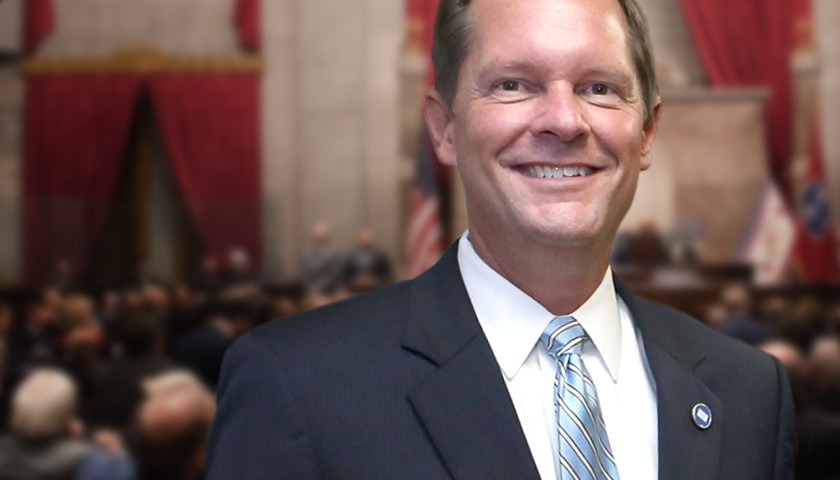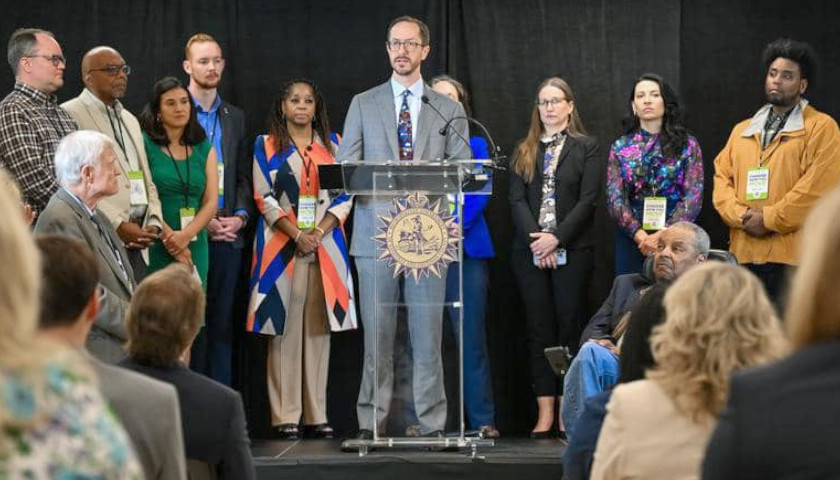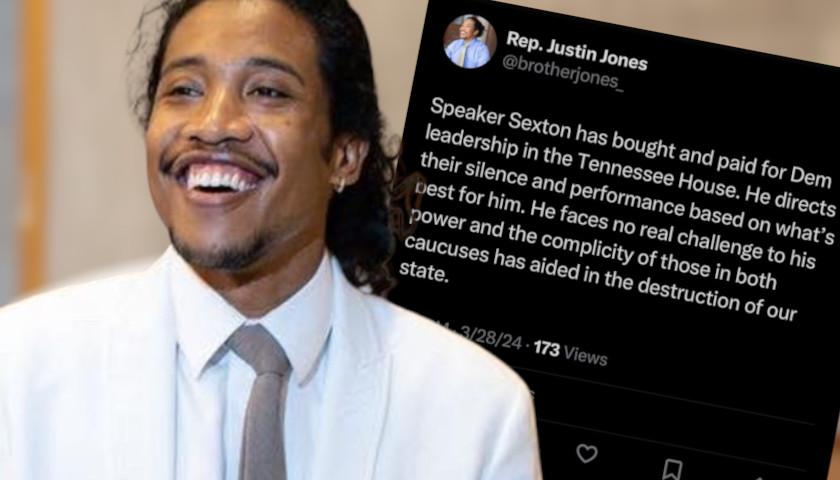As the 111th Tennessee General Assembly is set to enter its second session, newly elected Speaker of the House Cameron Sexton gave an exclusive interview to The Tennessee Star to discuss legislative priorities and current issues.
The General Assembly is set to reconvene on Tuesday, January 14 at 12 noon with Sexton (R-Crossville) at the dais as Speaker, having just been elected into the position on August 23, 2019, replacing Glen Casada (R-Franklin) who served as the House leader for the first year of the 111th General Assembly.
Of the upcoming session, Speaker Sexton expressed optimism, the reason for which he attributed to those who came before him.
“We have been blessed by having many great leaders for our state, giving the opportunity for this upcoming session to be in a place where our state really hasn’t been in before. We have a great opportunity to even further propel our state and make Tennessee’s torch shine even brighter for all Tennesseans.”
UPCOMING LEGISLATIVE PRIORITIES
Speaker Sexton then offered a preview as to what high-level priorities would be addressed through this year’s legislation.
‘We’re hoping to put some focus this session on meaningful healthcare reforms that will help promote a freer marketplace and more competition.”
With regard to education, Speaker Sexton said the focus would be on fourth grade reading proficiency issues. Calling reading “the backbone that propels the academic journey,” he acknowledged that “if you can’t read, it’s very hard to write and do math, science and other subjects.”
As Governor Bill Lee has also alluded to, Speaker Sexton confirmed, “Criminal justice is also a big thing this year.”
Speaker Sexton specifically emphasized “truth in sentencing,” and getting to a point more like the federal system where five years means five years and not two years.
“We want to make sure we continue to keep all Tennesseans safe and our communities safe,” Speaker Sexton added.
As he travels the state and talks with law enforcement, judges, district attorneys and public defenders, Speaker Sexton has found they all agree in unison that they’d like the state to go to more of a truth in sentencing model than the current system we have.
REFUGEE RESETTLEMENT
Last month, Speaker Sexton joined the Tennessee Star Report with Michael Patrick Leahy to weigh in on Governor Lee’s decision to allow refugees into Tennessee. At the time, Speaker Sexton, who was not involved in the decision, advised that here was ongoing research into whether the decision would be harmful to the lawsuit initiated by the legislature in 2016 against the federal government for costs forced on states resulting from refugee resettlement.
With regard to Governor Lee’s decision, which has caught the ire of some grassroots Tennesseans and prompted resolutions by some local legislative bodies to reject resettlement of refugees in their districts, Speaker Sexton was asked if he had any updated information to share on the lawsuit or other issues.
“We’re still looking at the lawsuit and what may or may not happen with that.”
The financial impact to the state is another topic Speaker Sexton is looking into.
“We’d like to work with our fiscal review department and see if we can come up with what this would cost the state as well as locals, because there’s some local costs with this as well,” Speaker Sexton responded.
He went on to explain, “One of the things we found out is that when refugees are granted that status in coming to America, they are immediately given a social security number and a social security card which then allows them to blend in with Tennessee citizens or American citizens.”
As such, Speaker Sexton said it’s very hard to determine how many refugees are here and how many are on government assistance.
Speaker Sexton’s comments are consistent with a 2013 report, “A Study on the Federal Cost Shift to the State of Tennessee as a Result of the Federal Refugee Resettlement Program,” which covered the years 1990 to 2012.
The study, which can be found here, was signed off by the senior fiscal analyst for the Fiscal Review Committee and presented to the Joint Government Operations Legislative Advisory Committee and has not been updated since that time, according to Speaker Sexton.
“That kind of lead us to believe there are legislative things that we can do to help fiscal review to identify what the true costs are and identify how many potential refugees we have here,” said Speaker Sexton.
Separate from the financial issues, Speaker Sexton had additional concerns regarding safety and said, “We have to learn from what’s happening in other countries.”
“One of the things we have to do, too, is – there’s much talk about legal or illegal, but when you look at what’s happened in Europe with the Syrian refugees in Paris and the different things, sometimes even those people who are trying to get into your country to do bad things if they find another path through a refugee program, sometimes they’ll take that because it gives them immediate status.”
Speaker Sexton went on to say that he understands that the vetting process is a lot better than it was two to four years ago, “But at the end of the day, you still have people who are wanting to come into America and cause harm, disruption and chaos.”
Expressing confidence in President Trump’s ability, Speaker Sexton said there is a responsibility to protect Tennessee residents. “I trust the President in being able to handle that on a world scale. Here, in Tennessee, we have the same duty to our residents in Tennessee to make sure we’re doing the same thing.”
As to the efficacy of the federal government’s vetting process, Speaker Sexton said, “All we can do is take the word of the people who are saying it.”
Looking to get additional information, Speaker Sexton added, “There’s some questions that we’d like our Congressional delegation properly answer about how they feel about it. They’re more on the front lines and probably talking about that on a day-to-day basis.”
He reiterated that more questions and issues continue to emerge. “As we go through refugee resettlement, and as we keep asking questions, we keep finding additional issues and concerns we have and we’re looking to address those as we move forward.”
PAID FAMILY LEAVE POLICY
Speaker Sexton was asked if the new paid family-leave policy for state employees announced earlier in the week would undergo fiscal review as part of the budget process.
In talking with colleagues in the House, Senate and around the capital, Speaker Sexton thinks people are concerned about the cost and how they may pay for it.
“The word that’s been used is that the cost is minimal.” He went on to say, however, that there have been previous pieces of legislation that have been proposed on the subject that “had a hefty price tag put on it.”
From a policy perspective, Speaker Sexton did say that the Governor has the right through executive order to do it for the 31,000 employees who are part of that branch of government. He speculated that there are an additional 3,000 employees who are outside of executive service that the Governor is looking to add to the legislation.
There are additional questions that Speaker Sexton is hearing from members, who are, in turn, hearing from their districts. Concerns have been raised about the true cost to the state, how it will be budgeted for and the productivity of state departments.
Relative to General Assembly members whose spouses are employed by the state and would be the beneficiary of this new employee benefit, and how legislators voting on the measure would appear to be a conflict of interest to taxpayers, Speaker Sexton said he doesn’t think there’s anything mandatory about declaring a conflict.
In his experience, Speaker Sexton said some members have declared a conflict of interest on various bills, but it is up to the individual member to determine if they want to disclose that and to seek counsel from House legal staff.
As far as a “trickle-down effect,” where city and county employees may want to have the same benefit, Speaker Sexton said that’s a question that House members have as well.
While not having seen the legislation, Speaker Sexton doesn’t think that the Governor’s legislation will broaden the policy to local government.
That doesn’t negate, however, that city and county employees won’t see the state’s initiation of the benefit as one that should be expanded to those jurisdictions as well.
IMPROVE ACT ROAD PROJECTS DELAYED COMPLETION
On the topic of the state’s roads, as The Star reported, the Tennessee Department of Transportation (TDOT) advised that the 962 projects identified and codified as part of the fuel tax increasing IMPROVE Act went from the 10-year timeline that the tax increases were supposed to support back to 20-plus years to complete.
While Sexton voted against the measure at the time, he was asked if there are any accountability measures that could come from the legislature.
As he has traveled across the state, Speaker Sexton has asked road builders about different infrastructure needs and one of the things they continue to address is that the cost of materials have increased at a higher rate than what was anticipated.
He said that as the House Transportation Committee starts to have budget hearings, those questions will be asked.
GROWTH OF STATE GOVERNMENT
The state continues to have a budget surplus, seen by conservatives as an over-collection of taxes, realizing a revenues of $300 million in excess of the budget as of November 2019. With the surpluses and the tax increases that were part of the IMPROVE Act and the additional family leave for state employees, there is the appearance that government is growing.
If state revenues continue on that course, Speaker Sexton was asked if he would be in favor of tax cuts – such as an increased number of sales tax free days – that would benefit all Tennesseans, as opposed to the specific cuts included as part of the IMPROVE Act, “What will Tennesseans get back?”
He responded that there’s going to be a “whole host of things to look at,” citing as examples the sales tax free holiday and the professional privilege tax.
The General Assembly while voting last year to remove the professional privilege tax on 15 professions, it still remains in effect for attorneys, securities agents, broker-dealers, investment advisers, lobbyists, osteopathic physicians and physicians.
Regarding growth in the state’s budget, increasing the rainy day fund to $1 billion counts as spending, according to Speaker Sexton. In addition, within the state’s Medicaid program known as TennCare, the medical inflation rate is three to four times higher than the normal inflation rate, advised Speaker Sexton.
“When you take out TennCare and the medical inflation rate and look at the overall state budget and how much it’s grown, over the nine years I looked at it, it’s only grown 1.8 to 1.9 percent. Over that same period of time, inflation has been 1.8 to 1.9 percent.”
He summarized, “I think the budget looks like it’s grown a lot, but I think a lot of that has to do with health costs in the TennCare program.”
WORKING WITH THE STATE SENATE
Finally, Speaker Sexton was asked about his long-time relationship with Speaker of the Senate and Lieutenant Governor Randy McNally, which goes back to when the latter was initially elected and Sexton worked on his campaign, and how that might impact what the General Assembly might be able to accomplish.
Speaker Sexton replied that a good relationship with someone doesn’t mean that you necessarily always agree. However, in the course of being in the General Assembly, on different things he’s worked with the Lt. Governor on, Speaker Sexton said that they have continued to develop their relationship.
“We worked out some legislation to where we were able to take both our ideas and mesh them together to make something better.”
Speaker Sexton continues to look at Lt. Governor McNally as a “valuable asset, someone that I trust and respect.”
Anticipating a positive tone between the two chambers in the upcoming session, Speaker Sexton concluded, “Balancing what the House wants to do with what the Senate wants to do with two leaders and a leadership team that’s willing to work together, we’ll be able to make policy much, much better than we ever anticipated, because of the ability for us to collaborate hopefully a little bit better than we have in the past.”
—
Laura Baigert is a senior reporter at The Tennessee Star.








